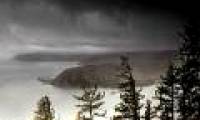
Video cameras mounted on autonomous underwater robots recorded volcanic cracks near a potentially active fault under Lake Baikal, Siberia.

Astronauts at the International Space Station watch sunrise and sunset 16 times / day; Panda can pretend to be pregnant for more care ... and many other Fun Scientific facts are

Earth is a special planet in the universe, there is life and many things that humans have not yet discovered.

A photographer has captured the magnificent image of a hundred-meter-long crack on Lake Baikal (Russia), which is the largest freshwater lake in the world and is believed to be

More than a resource, Lake Baikal is also one of the most famous tourist sites in the world with so many legend stories around ...

The United Nations Science, Education and Culture Organization recognized the Orkhon Valley of Mongolia as a World Cultural Heritage in 2004.

A 5,000-year-old grave near Lake Baikal in Siberia attracts many scientists' attention because of the eternal love shown in the clutches of the lovers in the grave.

Russian scientists released the device into Lake Baikal in hopes of shedding light on the nature of dark matter and the origin of the universe.

Russian and some other scientists have observed that algae grow very fast in the lake Baikal since 2011.

Recently, researchers found that about 130 seals drifted ashore on Baikal, the world's deepest lake in southern Siberia.
 Video cameras mounted on autonomous underwater robots recorded volcanic cracks near a potentially active fault under Lake Baikal, Siberia.
Video cameras mounted on autonomous underwater robots recorded volcanic cracks near a potentially active fault under Lake Baikal, Siberia. Astronauts at the International Space Station watch sunrise and sunset 16 times / day; Panda can pretend to be pregnant for more care ... and many other Fun Scientific facts are
Astronauts at the International Space Station watch sunrise and sunset 16 times / day; Panda can pretend to be pregnant for more care ... and many other Fun Scientific facts are Earth is a special planet in the universe, there is life and many things that humans have not yet discovered.
Earth is a special planet in the universe, there is life and many things that humans have not yet discovered. A photographer has captured the magnificent image of a hundred-meter-long crack on Lake Baikal (Russia), which is the largest freshwater lake in the world and is believed to be
A photographer has captured the magnificent image of a hundred-meter-long crack on Lake Baikal (Russia), which is the largest freshwater lake in the world and is believed to be More than a resource, Lake Baikal is also one of the most famous tourist sites in the world with so many legend stories around ...
More than a resource, Lake Baikal is also one of the most famous tourist sites in the world with so many legend stories around ... The United Nations Science, Education and Culture Organization recognized the Orkhon Valley of Mongolia as a World Cultural Heritage in 2004.
The United Nations Science, Education and Culture Organization recognized the Orkhon Valley of Mongolia as a World Cultural Heritage in 2004. A 5,000-year-old grave near Lake Baikal in Siberia attracts many scientists' attention because of the eternal love shown in the clutches of the lovers in the grave.
A 5,000-year-old grave near Lake Baikal in Siberia attracts many scientists' attention because of the eternal love shown in the clutches of the lovers in the grave. Russian scientists released the device into Lake Baikal in hopes of shedding light on the nature of dark matter and the origin of the universe.
Russian scientists released the device into Lake Baikal in hopes of shedding light on the nature of dark matter and the origin of the universe. Russian and some other scientists have observed that algae grow very fast in the lake Baikal since 2011.
Russian and some other scientists have observed that algae grow very fast in the lake Baikal since 2011. Recently, researchers found that about 130 seals drifted ashore on Baikal, the world's deepest lake in southern Siberia.
Recently, researchers found that about 130 seals drifted ashore on Baikal, the world's deepest lake in southern Siberia.









 Strange 'rich people's MSG', once no one bothered to buy it
Strange 'rich people's MSG', once no one bothered to buy it More than 1,000 artifacts unearthed on Mount Wudang
More than 1,000 artifacts unearthed on Mount Wudang Why did Empress Dowager Cixi eat 20 eggs every day, but the chef had to prepare 500?
Why did Empress Dowager Cixi eat 20 eggs every day, but the chef had to prepare 500? 8 mystical medieval books that are even scarier the more you read them
8 mystical medieval books that are even scarier the more you read them The majestic natural scenery is overwhelming on the most dangerous road in the world
The majestic natural scenery is overwhelming on the most dangerous road in the world Strange wood with the ability to change color: Ranked among the world's top in hardness and durability, Vietnam also grows it
Strange wood with the ability to change color: Ranked among the world's top in hardness and durability, Vietnam also grows it What's inside the world's largest Three Gorges Dam?
What's inside the world's largest Three Gorges Dam? The Y chromosome is gradually disappearing, predicting that men have a new sex gene
The Y chromosome is gradually disappearing, predicting that men have a new sex gene